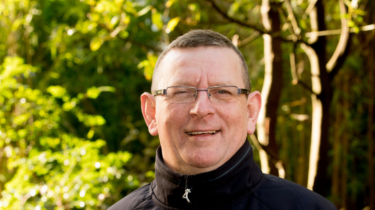Member Story: Adjusting To My Dementia Diagnosis And Why Early Diagnosis Matters

This Dementia Action Week (16th-22nd May), we're taking about the importance of a diagnosis. Here, Dementia NI Member Martin Murtagh, from Belfast, talks about the journey he went on to accept his diagnosis and how the support he received has helped him to live well.
Realising something was wrong
I went to see my GP quickly because I knew I was forgetting stuff and doing strange things like leaving the cooker on all night and leaving the taps on. The GP picked up on what was going on quickly. She sent me to the hospital to see a consultant who did tests to diagnose it. I was very truthful about what was happening. I didn't want to kid myself because I knew something wasn't right.
Eventually I had a brain scan done and my consultant sent for me very quickly after that. My son came with me to see the consultant when she gave me my diagnosis. They asked me if I wanted him in the room with me, but I wanted to go in on my own. When the consultant broke the news, I was in shock, but I kept myself together.
Struggling to accept my diagnosis
I was diagnosed with Alzheimer’s Disease. I was 63 at the time. I remember I was diagnosed on a very dark night and I didn’t like that. My consultant just told me, “Well, you’ll be alright Martin!” I was too scared to tell my son before he drove us home as I was afraid he might crash.
I was in denial at the start and convinced that it must be a mistake. I was in shock and there was so much going on in my head. I was worried my life as I knew it was over.
I was in a bad, bad place for a while. I’d been going to a day centre for people with dementia but the people there were in a more advanced stage of the condition. I stuck with it for a couple of months and went on outings and out for dinner with them and I appreciated the support but it wasn’t the right place for me.
One day I came home from the day centre feeling a bit depressed. I told a lady from the charity Age NI, who would come in to take me out during the week, why the day centre wasn't working for me. She put me in touch with Ashleigh [Empowerment Officer at Dementia NI] and I haven't looked back!
Enjoying the benefits of peer support
The day I went to my first Dementia NI peer support meeting, my life changed. I was hooked right away! From that first day I said, "I’m not going back to the day centre".
The Dementia NI peer support groups are brilliant. I take great comfort in being able to other people in the early to mid stages of dementia who know exactly what it is like for me. Plus the craic is ninety. I’ve never seen anyone come along to one of those meetings and not come back.
If I hadn’t been introduced to the Dementia NI peer support groups, I might not be here now. I’m convinced my dementia would've been more advanced. Those groups are the best thing that could’ve happened to me.
I understand that some people might be reluctant to be diagnosed. But people need to know that it’s important to diagnose dementia in the early stages. Okay, so you’ve still got dementia, but there’s more medication available now than ever before so at least you can get some treatment.
And if you get diagnosed in the early to mid stages you can come to the Dementia NI peer support groups and learn new things. The work that is going on in those groups to change things for the better for people with dementia across NI is better work than anybody else is doing.
Working to challenge the stigma of dementia
These days, I do a lot of work with Dementia NI to help people understand dementia better and reduce the stigma around it. Recently, I was pressing for Dementia NI members to be given ID cards explaining that we’ve got dementia. I knew that having that card would make an enormous difference because I can show it to people in shops when I need to communicate that I have a dementia diagnosis.
Everyone in my district now knows I have dementia. I don’t hide it from anyone and I have never denied it. People are very accepting and have said to me, “Fair play to you Martin for getting on with things.” Early on, there was the odd wee jibe about it. Occasionally someone would say something like, “No use telling you mate, you’ll forget” but I don’t take comments like that personally, it’s like water off a duck’s back to me!
While the tablets may help, there is no magic cure for dementia and you also need to help yourself and have a bit of willpower. Sometimes I have the urge to go into town on my own but I can't because I’ve gone missing on a few occasions in the past. But I'm around seven years on from my diagnosis now and I'm still enjoying life.
This Dementia Action Week, I want to say to anyone who is worried that they may have symptoms – go to your GP and push for a diagnosis as early as possible. Your life will become a whole lot easier and more liveable if you do. You may have to cut down on things, but you can still do stuff that you enjoy. If you leave it too long you may not be able to do the things you would’ve been able to do if you’d been diagnosed earlier.
Thank you to Martin for sharing his story.